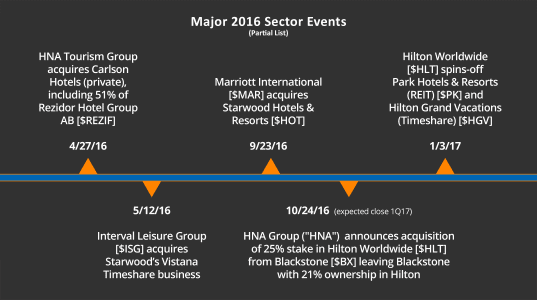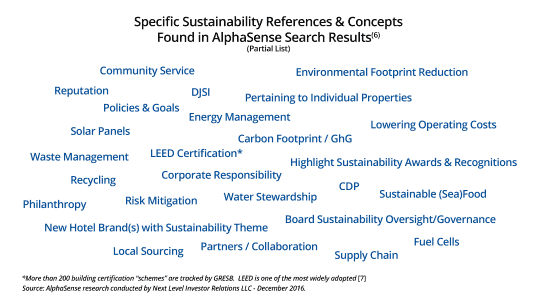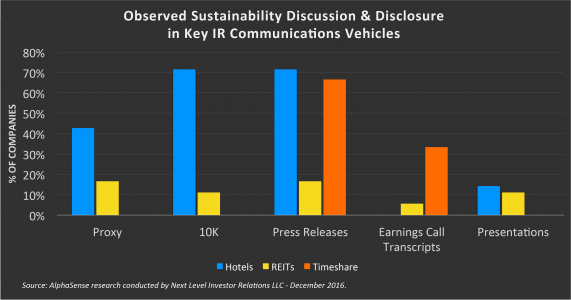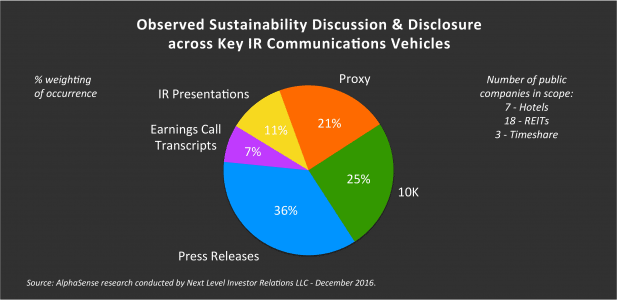2016 marked a year of extraordinary structural activity across leading U.S. lodging and leisure companies. Structure is just one element of strategy. The sector has exciting, untapped strategic sustainability opportunities to look forward to in 2017 and beyond.
To identify a baseline, I used AlphaSense at year-end to see what I could find on sustainability discussions and disclosures by publicly-listed U.S. sector companies across traditional investor relations (IR) communications vehicles, before affected reporting entity changes occur in 2017.
Key takeaway
To-date, sector leaders appear to have focused sustainability strategy mostly on attracting consumer interest and on beginning to lower operating costs through sustainability initiatives.
I believe individual sector companies can reach higher competitively through robust collaboration between sustainability and IR program strategies for ESG / sustainability positioning. Company leadership and IR teams should be able to differentiate and expand stakeholder relations, both from the bottom-up and top-down (traditional IR). This blog post provides a glimpse into the opportunities I see.
ESG is the interchangeable acronym for sustainability, most commonly used in the U.S. It stands for Environmental & Energy, Social Responsibility and Governance.
Why talk about this now?
Significant recent events have occurred in domestic lodging and leisure companies, such as M&A activity, spin-offs and IPOs and large foreign (Chinese) investments. These activities may alter the public reporting entities sustainability-related materiality thresholds and disclosure priorities in 2017 and beyond. Sector leaders have already figured out that it is prudent to build sustainability into customer marketing programs and new hotel brands to cater to the growing millennial and female demographics.
Tactically, the major sector events in 2016 noted above could make it harder for competitors and stakeholders to monitor sector peers’ sustainability programs and progress
Strategically, there are countless untapped opportunities for companies to reach higher for ESG/Sustainability program success and ROI. Similar shifting demographic implications extend to the investment community. A broader definition of “customer” to include investors and property owners is also relevant. I will take the rest of this blog to expand on this point.
Do investors really care?
- As of the latest U.S. SIF 2016 report, $8 trillion or 22% of institutional assets under management in the U.S. ($1 out of every $5 AUM) are now referring to ESG /Sustainability in investment decision-making, a 33% increase in two years.
- “75 million Americans born between 1978 and 2000 stand to inherit over $30 trillion from baby boomers during the next 30 to 40 years. Industry surveys of millennial investors also demonstrate a strong preference for sustainable and impact investment strategies and thinking long term about performance,” as noted by sustainable investment consultant, Paul Ellis.
- “In the U.S. women are expected to control half of private wealth by 2020, roughly $22 trillion. Although the majority of individual investors say they care about sustainable investing, women express higher interest than do men, 76% to 62%,” per Jean Rogers, founder and CEO of the Sustainability Accounting Standards Board (SASB)
According to the Global Real Estate Sustainability Benchmark Survey (GRESB)
“2016 data shows that ESG is increasingly embedded in infrastructure investments, with more than 90% of participating funds having ESG policies and including ESG considerations in their investment processes.”[7]
“More than 280 members, including 58 pension funds and their fiduciaries, use GRESB data in their investment management and engagement process, with a clear goal to optimize the risk / return profile of their investments.”[6]
As noted by the National Association of Real Estate Investment Trusts (
NAREIT), “The annual GRESB survey is endorsed and closely watched by many of the world’s largest institutional investors, representing, in 2014, more than $5.5 trillion in institutional capital under management.”
Do companies really care?
Cornell University School of Hotel Administration, noted for both its undergraduate and graduate hospitality degree programs, conducts an ongoing international project to gather default sustainability data for the global hotel industry. It currently collaborates with eleven global hotel firms and analyzes data provided for 8,880 properties.[9] The participant firms recognize that this sector has ample opportunity to drive sustainability on a global basis and that it is important for them to be able to analyze their environmental data against Cornell industry benchmarking to drive improvements and to promote their individual efforts
NAREIT found by surveying participant company energy projects, the ROI reported in 2014 was 40%, compared to the average ROI of 26% during the 2011 – 2013 period.[
Competitive positioning
Lodging and leisure companies are far more complex and inter-connected than meets the eye.
First, let’s define “customer:” For the asset owner / operator lodging company business model, hotel guests are simply the customer. Both hotel guests and property owners are important customers for the management fee-based business model; but this mix can vary greatly by company. There are also the capital customers, e.g. equity, fixed income and other investors.
As noted above, sector leaders appear to have focused mostly on attracting consumer interest. In terms of sustainability program strategy and execution, there could be many other angles from which a company might coordinate IR strategy and disclosure.
Next, let’s consider that the ESG / sustainability field is far more adaptable to competitive strategy than the lodging and leisure sector has yet incorporated, by relative comparison to other sectors.[12][13]
The following images and charts show what I found in my research using AlphaSense.
The goal of my research was to get a snapshot of baseline ESG / sustainability discussions and disclosures by the U.S. lodging and leisure sector’s publicly traded companies. I wanted to see how sustainability may have permeated the previously familiar reporting entities’ traditional investor relations disclosure over the past two years (as generated by AlphaSense timeframe search). This was important to do now before entity combinations and reporting changes driven by the major 2016 sector events take effect for the full New Year 2017.
Here are six high-level observations from the results of my AlphaSense research:
- There are clearly leaders and laggards in each category: Hotels, REITs, and Timeshare
- Timeshare may or may not have the same incentives to competitively pursue ESG / sustainability
- Second tier hotel company(s) may have taken the lead in bridging their sustainability program successes into competitive IR strategy and communications
- Numerous press releases highlighted sustainability improvements at individual hotel properties. These properties are only a drop in the contextual bucket of thousands of properties owned and / or managed by publicly traded REITs and Hotel companies
- Several REITs clearly stated that they are incorporating sustainability in their own investment decision-making
- Myriad announcements of specific sustainability programs, projects, partnerships and collaborations warrant perspective in terms of goals, progress and material bottom-line impact
Approach
The scope of U.S. companies I could research in the sector using AlphaSense included 7 Hotel companies, 18 Lodging REITs and three Timeshare companies:
Hotel Companies: Choice Hotels ($CHH), Extended Stay America ($STAY), Hilton Worldwide ($HLT), Hyatt Hotels ($H), Marriott International ($MAR), Starwood ($HOT), Wyndham Worldwide ($WYN)
Lodging REITS: Apple Hospitality ($APLE), Chatham Lodging Trust ($CLDT), Chesapeake Lodging Trust ($CHSP), Condor Hospitality ($CDOR), Diamondrock Hospitality ($DRH), Felcor Lodging Trust ($FCH), Hersha Hospitality Trust ($HT), Hospitality Properties Trust ($HPT), Host Hotels & Resorts ($HST), Innsuites Hospitality Trust ($IHT), LaSalle Hotel Properties ($LHO), Pebblebrook Hotel Trust ($PEB), RLJ Lodging Trust ($RLJ), Ryman Hospitality Properties ($RHP), Sotherly Hotels ($SOHO)($MCL), Summit Hotel Properties ($INN), Sunstone Hotel Investors ($SHO), Xenia Hotels & Resorts ($XHR)
Timeshare Companies: Diamond Resorts ($DRII), Interval Leisure Group ($ILG), Marriott Vacations ($VAC)
Final note
As I identified in my most recent AlphaSense blog post, it is becoming noticeable that some utility sector leaders have been quietly bridging their company’s sustainability program successes into their IR communications strategy. I believe this also holds true in the lodging and leisure sector.








